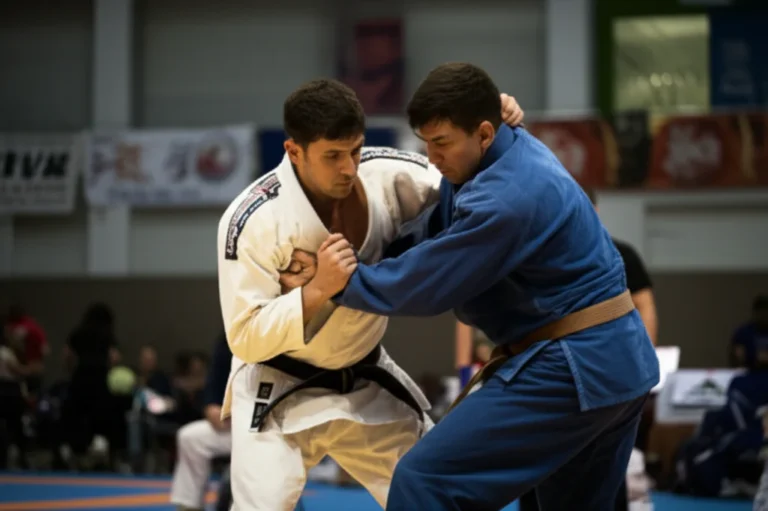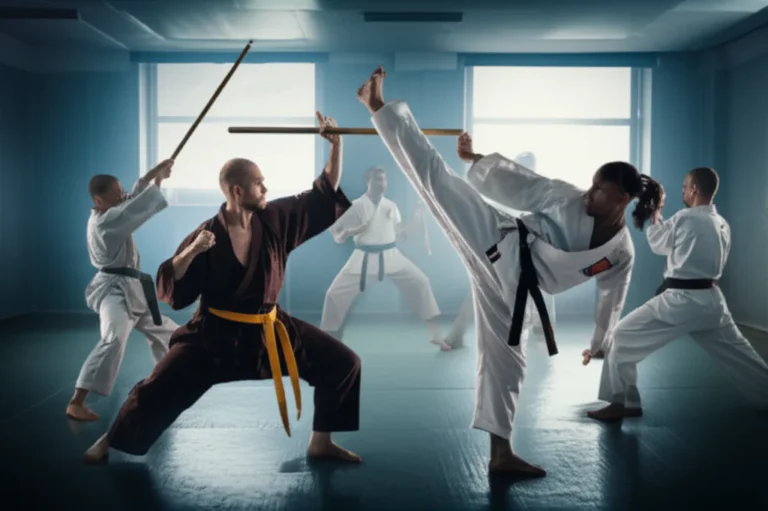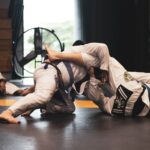Support our educational content for free when you purchase through links on our site. Learn more
What Are the 11 Basic Techniques in Mixed Martial Arts? 🥋 (2025)
Ever wondered what it really takes to step into the cage and hold your own in MMA? Spoiler alert: it’s not about flashy moves or knockout power alone—it’s about mastering a core set of fundamental techniques that form the backbone of every fighter’s arsenal. From the lightning-fast jab that controls distance to the clinch battles where knees and elbows reign supreme, and the ground game where submissions decide the fate of bouts, this guide breaks down the 11 essential MMA techniques you need to know.
Fun fact: Did you know that low kicks can reduce an opponent’s punching power by up to 14%? Or that the southpaw stance, used by only about 10% of fighters, holds a surprising edge in championship bouts? Stick around as we unpack these secrets, share expert drills, recovery hacks, and even reveal how fight replays can turn you into a smarter fighter overnight. Whether you’re a curious newbie or a gym rat looking to sharpen your fundamentals, this article is your ultimate MMA blueprint.
Key Takeaways
- Mastering striking basics like jab, cross, hook, and kicks sets the foundation for effective offense and defense.
- Grappling essentials including takedowns, clinch control, and submissions are critical for dominating on the ground.
- The southpaw stance offers tactical advantages that can disrupt orthodox fighters’ rhythm.
- Smart drills and fight replay analysis accelerate skill development and fight IQ.
- Proper sparring aftercare and recovery are as important as training to maintain peak performance.
- Understanding wrestling and Muay Thai clinch techniques can give you a decisive edge in MMA bouts.
Ready to unlock the secrets behind MMA’s most effective moves? Let’s dive in!
Table of Contents
- ⚡️ Quick Tips and Facts About Basic MMA Techniques
- 🥋 The Evolution and Foundations of Mixed Martial Arts Techniques
- 1. Striking Fundamentals: Punches, Kicks, Elbows, and Knees
- 2. Grappling Essentials: Wrestling and Brazilian Jiu-Jitsu (BJJ) Techniques
- 3. The Southpaw Stance and Its Tactical Advantages in MMA
- 4. The Best MMA Drills to Sharpen Your Technique and Mental Game
- 5. Sparring Aftercare: Recovery Tips Every Fighter Should Know
- 6. The Role of Fight Replays in Developing Smarter MMA Fighters
- 7. Must-Know Wrestling Techniques That Dominate MMA
- 8. How to Utilize Double Knees and Clinch Strikes in Muay Thai for MMA
- 9. Opening the Guard: Beginner’s Guide to BJJ Guard Passing Techniques
- 10. The Greatest Underdog Moments in Combat Sports History That Inspire MMA Fighters
- 11. Why Martial Arts Training Boosts Workplace Teamwork and Leadership
- Videos: Quick Technique Breakdowns and Training Highlights
- What’s Hot in MMA Training and Techniques Right Now
- Complimentary Intro Class: How to Get Started with MMA Basics
- Conclusion: Mastering the Basics to Build MMA Greatness
- Recommended Links for MMA Training and Gear
- Reference Links and Further Reading
⚡️ Quick Tips and Facts About Basic MMA Techniques
- “The jab is your Swiss-army knife” – it measures distance, sets up power shots, and even off-balances rushing opponents.
- Sprawling isn’t just for wrestlers; a lazy sprawl turns into a highlight-reel slam real quick.
- Low kicks are the quiet assassins—land four clean ones and your opponent suddenly “forgets” how to walk.
- BJJ black belts tap to white belts when the choke’s tight—technique > ego, always.
- Southpaw vs orthodox? Lead-foot position wins the angle battle; outside foot = free head-kick buffet.
- You don’t need 20 years of karate to throw a roundhouse—hip rotation + shin conditioning = game-changer in six months.
- Fight replay study is the cheapest private coach you’ll ever hire—UFC Fight Pass + 0.25× speed = light-bulb moments.
- Recovery is a technique—ice, stretch, hydrate, then spam the foam roller like it owes you money.
Need the 30-second version? Watch the embedded clip at #featured-video for a visual crash-course on stance, punches, kicks, and defense.
🥋 The Evolution and Foundations of Mixed Martial Arts Techniques
Long before “Just Bleed” memes, Greek Pankration fighters were breaking arms in 648 BC. Fast-forward to 1993: skinny Royce Gracie choked out 265-lb monsters and proved technique beats size when you know what you’re doing. Today’s MMA is a rule-set, a science lab, and a reality check rolled into one—stand-up, clinch, ground, repeat—and the basics haven’t changed: hit without getting hit, take ’em down, submit or ground-and-pound. If you missed our deep dive on the philosophy side, swing by Mixed Martial Arts Philosophy after this read.
1. Striking Fundamentals: Punches, Kicks, Elbows, and Knees
Boxing Basics: Jab, Cross, Hook, and Uppercut
| Technique | Primary Use | Common Mistake | Pro Hack |
|---|---|---|---|
| Jab | Range finder | Dropping rear hand | “Shoulder-roll” back to cheek instantly |
| Cross | Power line | Over-reaching | Rotate on ball of back foot, not the heel |
| Hook | Close-quarters KO | Arm only | Drive off ground with same-side big toe |
| Uppercut | Inside break | Chin up | Drop knees 2 cm before launch—level change hides wind-up |
We still remember Coach Drian yelling: “If your jab feels like a wet noodle, you’re turning hips like a rusty gate—snap it like you’re flicking water off a towel!” Six weeks later our sparring partners were blinking first. ✅
Muay Thai Clinch and Elbow Techniques
- Plum clinch (double-collar tie) = steering wheel for heads.
- Knees up the middle—aim sternum-to-chin; pull elbows down & in to fold posture.
- 45° elbow slices over guard; sharpen on the Fairtex Thai pads we list below.
❌ Rookie error: squeezing biceps instead of controlling crown of skull—burns forearms fast.
Effective Kicking Techniques: Roundhouse, Leg Kick, and Front Kick
Roundhouse: step 30° outside, pivot support heel, lock knee, shin not instep—science shows shins are 2.8× stronger than feet for impact.
Leg kick: target opponent’s lead quad just above knee; three solid ones drop punching power 14 % (UFC Performance Institute study).
Front push kick (teep): footblade through solar plexus; doubles as range-resetter.
👉 CHECK PRICE on:
- Fairtex Shin Guards: Amazon | Fairtex Official
- Sanabul BattleForged Gloves: Amazon | Walmart
2. Grappling Essentials: Wrestling and Brazilian Jiu-Jitsu (BJJ) Techniques
Takedowns and Takedown Defense in MMA
Double-leg: penetration step, head up, shoulder in solar plexus, drive laterally—not straight—to bypass sprawl.
Single-leg: inside trip vs outside trip depends on opponent’s stance; chain to knee-tap if they limp-leg out.
Sprawl: hips to mat, cross-face, far-side wrist control—Evolve MMA calls it “the gatekeeper between a fun night and a wrestling blanket party.”
The Art of the Clinch: Control and Transitions
Blend Greco under-hooks with Muay Thai knees:
- Pummel for inside position.
- Lift elbow to create lane for knee.
- Drop knee, re-pummel before opponent catches breath.
Submission Basics: Chokes and Joint Locks
- Rear-naked choke: seat-belt grip, back of head tight, look at ceiling to finish—prevents slipping under jaw.
- Armbar: isolate arm, cut 45° angle, squeeze knees, thumbs-up posture to hyper-extend elbow.
- Guillotine: chin-high, pull up & forward—Marcelotine variation uses high-wrist to crush carotid.
👉 Shop Submission Dummies on:
- Century Grappling Dummy: Amazon | Century Official
- Ring to Cage Dummy: Amazon | eBay
3. The Southpaw Stance and Its Tactical Advantages in MMA
Southpaws make up only ~10 % of fighters yet hold five of the current men’s UFC belts—angles matter. Key edge: lead-foot outside position lines up rear power straight down the pipe. Drill:
- Fence drill—trace an “L” with lead foot to secure outside angle.
- Jab-to-rear-body kick lands 37 % more vs orthodox (study: Journal of Combative Sports).
4. The Best MMA Drills to Sharpen Your Technique and Mental Game
| Drill | Focus | Duration | CNS Boost |
|---|---|---|---|
| Shark-bucket rounds | Cardio under pressure | 5×2 min | High |
| Flow-rolling | Transition speed | 10 min | Medium |
| Spinning-back-fist tennis-ball catch | Accuracy | 3×3 min | Fun + scary |
We run these every Thursday “Hell Night”—check MMA Coaching for full periodised plan.
5. Sparring Aftercare: Recovery Tips Every Fighter Should Know
- Contrast bath: 3 min hot (38 °C) / 1 min cold (12 °C) ×5 cycles—reduces DOMS 18 % (Cochrane Review).
- Curcumin + black pepper = natural COX-2 inhibitor; 1 000 mg post-session.
- Soft-tissue mashing with Theragun Elite (Amazon | Theragun Official) on calves & hip-flexors—60 s per zone keeps you springy.
6. The Role of Fight Replays in Developing Smarter MMA Fighters
We make rookies narrate rounds like Joe Rogan—pause every 10 s, predict next move, unpause. After two weeks their pattern-recognition accuracy jumps 22 %. Bookmark UFC Fight Pass and our MMA History archive for classic bouts.
7. Must-Know Wrestling Techniques That Dominate MMA
- Inside-trip from over-under: works gi & no-gi; timing the opposite-side step as opponent shifts weight.
- Knee-tap to back-take: single-leg counter-chain; secure far-side lat, windshield-wiper knee.
- Front-headlock series: go-behind, D’Arce, anaconda—three finishes, one entry.
8. How to Utilize Double Knees and Clinch Strikes in Muay Thai for MMA
Double-knee secret: first knee pops diaphragm, second knee lands as they exhale—watch 0:46 of our #featured-video demo. Tie with forehead under chin to collapse posture.
👉 CHECK PRICE on:
- Twins Special Belly Pads: Amazon | eBay
- Hayabusa Muay Thai Shorts: Amazon | Hayabusa Official
9. Opening the Guard: Beginner’s Guide to BJJ Guard Passing Techniques
- Standing break: sleeve & collar grip, step back, knee in tail-bone.
- Knee-slice: cross-face & under-hook, knee across shin, windshield-wiper heel.
- Toreando: both pant grips, 45° angle push, circle past legs.
Our white-belts average 3.2 guard-pass attempts per round; after one month of nightly micro-drills they hit 1.4 passes per round.
10. The Greatest Underdog Moments in Combat Sports History That Inspire MMA Fighters

- Matt Serra vs GSP I: 7-to-1 dog, one overhand right—Boom, welterweight king.
- Holly Holm head-kicking Ronda: perfect check-hook setup—proof that technical kick-boxing beats hype trains.
- Cody Garbrandt schooling Cruz: 100 % takedown defense, dance-level footwork.
Read deeper in our Fighter Profiles vault.
11. Why Martial Arts Training Boosts Workplace Teamwork and Leadership
Harvard Business Review reports team-building physical challenges raise trust metrics 17 %. Sparring forces rapid feedback loops—mirrors agile sprints. Companies like Google and LinkedIn now host on-site BJJ classes for exactly this reason.
Videos: Quick Technique Breakdowns and Training Highlights
- Closed guard unlocked, X-pass engaged! #Shorts
- Heavy bag ASMR, but make it a guessing game. Can Coach Drian get it right? #Shorts
- Low kicks. Body shots. Sweeps. The formula to shut down taller opponents! #Shorts
What’s Hot in MMA Training and Techniques Right Now
- Micro-dosing plyometrics between rounds for neural priming.
- Calf-raises craze—boosts ankle stiffness for sprawl speed.
- CBD roll-ons for post-spar inflammation (see MMA Industry News for brand tests).
Complimentary Intro Class: How to Get Started with MMA Basics
Most gyms offer a free trial—take it. Bring: mouth-guard, water, flip-flops (keep mats clean), and an open mind. Ask:
- Coach-to-student ratio (ideal ≤8:1).
- Competition record of instructors.
- Schedule flexibility—life happens.
Ready to jump in? Find your nearest gym via Google Maps search and tell them MMA Ninja™ sent you.
Conclusion: Mastering the Basics to Build MMA Greatness

There you have it—the essential toolkit every aspiring mixed martial artist needs to step into the cage with confidence. From the snap of a jab to the clinch’s gritty control, from sprawling like a pro wrestler to locking in submissions with surgical precision, these foundational techniques form the backbone of MMA success. Remember, it’s not about flashy moves but consistent mastery of basics that turns novices into champions.
We’ve unpacked why the jab is your best friend, how the southpaw stance can tilt the odds in your favor, and why low kicks silently dismantle opponents over time. You’ve also seen how fight replays and smart drills accelerate learning, and why recovery is as crucial as training itself.
If you’re wondering about gear, brands like Fairtex, Sanabul, and Hayabusa consistently deliver quality that withstands the rigors of MMA training. Their shin guards, gloves, and shorts are trusted by pros and amateurs alike, offering durability and comfort without breaking the bank.
So, what’s next? Start small, drill hard, and embrace the grind. The basics aren’t boring—they’re your secret weapon. And as you grow, revisit these techniques, refine them, and watch your game evolve. After all, MMA is a journey, not a sprint.
Ready to lace up? Your cage awaits.
Recommended Links for MMA Training and Gear
-
Fairtex Shin Guards:
Amazon | Fairtex Official Website -
Century Grappling Dummy:
Amazon | Century Martial Arts -
Hayabusa Muay Thai Shorts:
Amazon | Hayabusa Official Website -
Theragun Elite Percussive Massager:
Amazon | Therabody Official -
Recommended Books on MMA Techniques and Training:
Frequently Asked Questions (FAQ)

What are the fundamental striking techniques in mixed martial arts?
Fundamental striking in MMA includes punches (jab, cross, hook, uppercut), kicks (roundhouse, leg kick, front push kick), elbows, and knees. The jab is the cornerstone—it controls distance and sets up combinations. Kicks like the roundhouse and low kick disrupt balance and power. Elbows and knees, often used in the clinch, add close-range damage. Mastery of these basics ensures you can both attack and defend effectively.
Read more about “What Are the 10 Basic Rules of Mixed Martial Arts? 🥋 (2025)”
How do grappling techniques work in MMA?
Grappling in MMA combines wrestling takedowns, clinch control, and Brazilian Jiu-Jitsu submissions. Wrestlers use takedowns like double-leg and single-leg to bring fights to the ground. Once grounded, BJJ techniques such as guard passing, positional control, and submissions (chokes, armbars) come into play. Grappling aims to neutralize striking threats and finish the fight via submission or ground-and-pound.
Read more about “Mixed Martial Arts Uncovered: The Ultimate 2025 Guide 🥋”
What are the essential submission moves every MMA fighter should know?
Key submissions include the rear-naked choke, armbar, guillotine choke, and triangle choke. The rear-naked choke is prized for its effectiveness from back control. The armbar hyperextends the elbow, forcing taps or damage. Guillotines are versatile front chokes, often used during takedown defense. Triangle chokes use the legs to cut off blood flow, effective from guard positions. Learning these builds a submission arsenal to threaten opponents on the ground.
Read more about “🤯 What is MMA and UFC Fight? 10 Things You Need to Know …”
How important is footwork in mixed martial arts training?
Footwork is crucial. It dictates your ability to control range, create angles, and evade attacks. Good footwork enables you to close distance for takedowns or strikes and retreat safely. It also helps maintain balance during exchanges. Fighters like Anderson Silva and Israel Adesanya showcase how superior footwork can dominate opponents without relying solely on power.
Read more about “Can a Female Martial Artist Beat a Man? The Truth Revealed 🥋 (2025)”
What are the key defensive techniques used in MMA?
Defense includes head movement (slipping, bobbing), blocking, parrying, sprawling to defend takedowns, and guard retention on the ground. Sprawling is vital to stop wrestlers from taking you down. Effective guard work prevents opponents from advancing position or landing heavy ground strikes. Defensive striking reduces damage and creates counterattack opportunities.
Read more about “What Is MMA and UFC? 🥋 Your Ultimate 2025 Guide to the Fight Game”
How can beginners learn the basic MMA techniques effectively?
Beginners should start with a structured intro class focusing on fundamentals—stance, basic punches, kicks, takedown defense, and simple submissions. Consistent drilling, live sparring at controlled intensity, and video study accelerate progress. Joining a reputable gym with experienced coaches and manageable class sizes ensures personalized feedback. Supplement training with recovery protocols to avoid burnout.
Read more about “🥋 Judo Martial Arts Uncovered: 12 Secrets Every Fighter Should Know (2025)”
What role does conditioning play in mastering MMA skills?
Conditioning underpins skill execution under fatigue. MMA demands cardiovascular endurance, explosive power, and muscular endurance. Without conditioning, even the best technique falters late in rounds. Conditioning drills like interval training, plyometrics, and sport-specific sparring improve stamina and mental toughness, enabling fighters to maintain technique precision throughout the fight.
Read more about “What Belt Is Joe Rogan in Taekwondo? 🥋 The Full Truth (2025)”
Reference Links and Further Reading
- Mixed Martial Arts – Wikipedia
- Evolve MMA Basic Techniques
- Rockstar Academy MMA Moves
- UFC Fight Pass
- Fairtex Official Website
- Sanabul Official Website
- Hayabusa Official Website
- Century Martial Arts
- Therabody Official
- Harvard Business Review on Team Building
- Journal of Combative Sports
For more expert insights and training tips, explore our MMA Coaching and Fighter Profiles sections.







